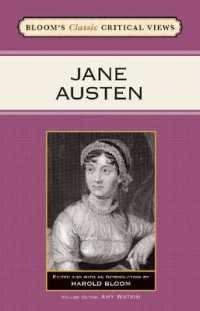- ホーム
- > 洋書
- > 英文書
- > Literary Criticism
Full Description
Explores Doris Lessing's innovative engagement with historical change in her own lifetime and beyondThe death of Nobel Prize-winning Doris Lessing sparked a range of commemorations that cemented her place as one of the major figures of twentieth- and twenty-first-century world literature. This volume views Lessing's writing as a whole and in retrospect, focusing on her innovative attempts to rework literary form to engage with the challenges thrown up by the sweeping historical changes through which she lived. The 12 original chapters provide new readings of Lessing's work via contexts ranging from post-war youth politics and radical women's writing to European cinema, analyse her experiments with genres from realism to autobiography and science-fiction, and draw on previously unstudied archive material. The volume also explores how Lessing's writing can provide insight into some of the issues now shaping twenty-first century scholarship including trauma, ecocriticism, the post-human, and world literature as they emerge as defining challenges to our own present moment in history.Key FeaturesOffers a critical overview of the full range of Lessing's work, setting the agenda for future study of her writingProvides new readings of an unprecedented range of Lessing's writing, including previously unstudied archive material, landmark novels such as The Golden Notebook, drama and reportage, essays, memoirs and short storiesSituates Lessing in relation to new literary and cultural contexts, including the nineteenth-century novel-series, cinema, and post-war youth cultureRelates Lessing's work to contemporary theoretical debates on post-humanism, trauma, ecocriticism, radical women's writing and world literature
Contents
Timeline; Introduction; 1. Early Lessing, Commitment, the World, Adam Guy; 2. 'I'm an adolescent. And that's how I'm going to stay': Lessing and Youth Culture 1956-1962, Nick Bentley; 3. Sequence, Series, and Character in Children of Violence, Kevin Brazil; 4. The Politics of Form: The Golden Notebook and Women's Radical Literary Tradition, Rowena Kennedy-Epstein; 5. Readers of Fiction and Readers in Fiction: Readership and The Golden Notebook, Sophia Barnes; 6. From The Grass is Singing to The Golden Notebook: Film, Literature, and Psychoanalysis, Laura Marcus; 7. 'A funny thing laughter, what's it for?': Humour and Form in Lessing's Fiction, Cornelius Collins; 8. Lessing and the Scale of Environmental Crisis, David Sergeant; 9. Lessing and Time Travel, David Punter; 10. Lessing's Interruptions, Tom Sperlinger; 11. Lessing's Witness Literature, Elizabeth Maslen; 12. A Catastrophic Universe: Lessing, Posthumanism, and Deep History, Clare Hanson; Select Bibliography.







